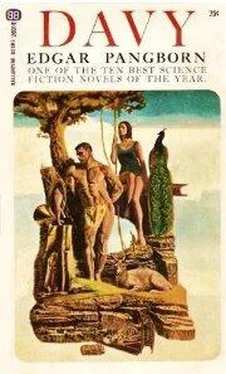It is a peculiarity of Penn that except for the Delaware River between her and Katskil, and a little jag of territory north of the Delaware’s headwaters that used to be a boundary with Moha, her only border is with the wilderness. I believe no one outside the conсdence of the republic’s government has any notion how far beyond that wilderness border Penn explorers may have penetrated. I can’t think of anything more graceful than a cultured Penn citizen changing the subject when the west is mentioned. We were at Jontown in the summer of 321, as far west as any Rambler gang or other foreign group is ever allowed to go; and yet a small road does lead out of that town westerly, up into the mountains, passing right by a large sign that reads END OF TRAVEL.
As for religion, Penn people appear to take it lightly and calmly, going through the motions, putting up with the flummery in a satisfying tongue-in-cheek manner, as large sections of the population evidently did in Old Time for the sake of keeping peace with the neighbors and avoiding the bitterness of true-believing priests. It is not entirely an honest way, nor a good way in my opinion; I could never take it for my way. But it does make for good manners and a certain peacefulness, and I could blame no one very much for following it, if he has no convictions strong enough to be worth the sacrifice of good nature, or if he feels that a polite conformity with the notions of fools is a necessary protection for his adult labors.
Not that I imagine the Penn people to be a super-race operating in secret of any such fairy-tale crud. There in Penn you encounter a full supply of the old mythologies, ignorance, piety, illiteracy, barbarism. But I did sometimes feel that there might be a good deal of curious thought and ferment behind the smiling indolent surface. And I often felt in the presence of Penn people like an energetic barbarian myself, surely not from any wish of theirs to make me feel so. I think that Penn is, not excepting Nuin, the most nearly civilized of the countries we have left behind us. If one had to live somewhere away from Neonarcheos, one could do worse than dwell in Penn with one or two of the big-lipped, deep-breasted women, and grow old with just enough work and worry to enjoy the other hours of idleness or slow lovemaking in the sun. Penn is not like other lands.
My father died there.
It happened in the autumn of 321 at the town of Betlam, which is forty miles north of Filadeffia — distances are large in Penn — and not far from the Delaware. Sam was fifty-six that year, he told me. Fifty-six, full of piss and vinegar and meanness, he said — but at other times, as I’ve mentioned, he remarked that he was getting old.
We had gone to Jontown along the southern limits of Penn, which are marked — (so far as we’re told) — by a wide twisting river called the Potomac as far as a town named Cumberland. There the only road is One that leads north. From Jontown we came back eastward by a northern route, Pa Rumley having it in mind to winter in western Katskil perhaps, or wherever we might happen to be when November arrived. (Pa didn’t enjoy Penn as much as the rest of us — Mother Spinkton sold badly there, the people preferring their own yarb-women and being uncommonly healthy anyhow. Peepshows didn’t do very well either, for Penn citizens are remarkably unconcerned at nakedness in spite of all the church can do to distress them about it: I’ve seen a Penn girl who felt a fleabite flip off her skirt on the street and go to searching with no sign of embarrassment, and onlookers didn’t regard her with breathless horror — they just laughed and offered bad advice.) There at Betlam a number of us fell sick with what seemed at first to be mere heavy colds, with a good deal of coughing and fever. Matters quickly grew worse.
Many of the townfolk had been troubled the same way, we learned, for several weeks. They were disturbed to think we had caught the sickness from them — a generous, decent place, where they understood music also, actually listening as crowds seldom do — and they did everything they could for us.
Pa hadn’t even tried a medicine pitch there at Betlam. He snarled — around camp where no Penn ear could hear him — that they were hightoned crum-bums who didn’t understand science: Mother’d be wasted on them. But he knew that was foolish talk, and his heart wasn’t in it. When the sickness began to alarm us, he took Mother Spinkton himself, and grumbled that it wasn’t a good vintage — maybe he’d left out some God-damn essential, getting old and incompetent, somebody’d ought to bury him if he was getting that senile — and he went about miserably among us with a bottle of her, and a lost look. No bullying, no insisting that we swallow her. Some of us missed his natural manner so much that we drank her in the hope of curing him . It was a bad time.
Nell Grafton’s boy Jack, turned fourteen that year, was the first to die.
Sam had been sitting up with him because Rex and Nell were both quite sick. This was in my wagon. I was already nearly recovered from a light attack of whatever it was. I heard Sam call me in sudden alarm, and I got to Jack’s compartment in time to see the poor kid with a blazing red face — I’d given him his last licking only two weeks before, for tormenting a stray cat — apparently choke to death on his own sputum. It happened too fast; nothing Sam or I could do. My Da sent me for Pa Rumley, and as I ran off I heard him coughing distressfully; he had been seedy for a couple of days but refused to worry about himself. I found Pa helplessly drunk, no such thing as waking him, and so I fetched Mam Laura instead. I remember how a glance was enough to tell her what had happened to Jack, and then she was staring down at Sam, who sat on a stool by Jack’s bunk swaying, his eyes not quite focussing. “You’ll go to bed now, Sam.”
“Nay, Laura, I’m not in bad shape. Things to do here.”
“We’ll do them. You’re to go and rest.”
“Rest. Why, Laura, it’s been, like, a mixed-up hardworking time, you could say. You see, being a loner by trade—”
“Sam—”
“Nay, wait. Seems I got the sickness, I want to say something while my head’s clear — you seen how it goes, they get off in the head. Now—”
She wouldn’t let him talk until we’d got him over to their wagon and into his bunk. I had never before seen her haunted and terrified, unequal to an emergency. Once in bed and yielding to it, Sam did not talk much after all. All I could receive from his difficult and presently rambling speech was that he wanted to thank us — Mam Laura and me — because we had known him without preventing him from being a loner by trade. At least I think that was what he tried to say.
His mind seemed remote after conveying that much to us, but his body was immensely stubborn, unwilling to yield. His battle to breathe lasted three days and part of a fourth night. The medicine priests — there were two in Betlam — came and went, helping us with Sam and three others who were sick, kindly men somewhat less ignorant than those I’ve met outside of Penn. We made them understand that Sam was unable to speak; he was quite conscious at that moment, sneaking me a grateful look behind their backs and the remnant of a grin when I said my father had made a true confession of faith before speech became impossible.
On the third day we thought he might win through — Nell Grafton had, and Rex, and Joe Dulin. But the decline followed. He regained a slight power of speech for an hour, and talked of his childhood in the hill country and remembered loves. After that, each breath was a separate crisis of a lost war. I am reasonably certain nowadays, from knowing the books, that Old-Time medicine might have healed him. We have no such art.
Читать дальше












